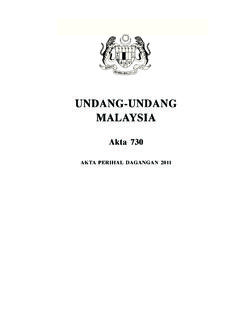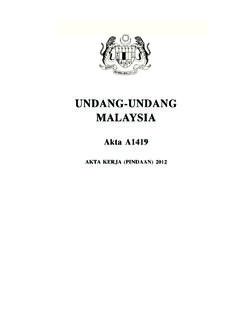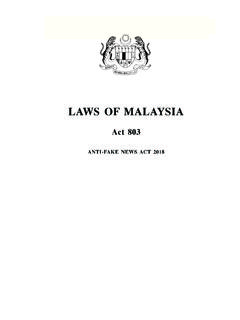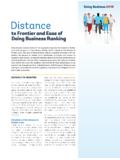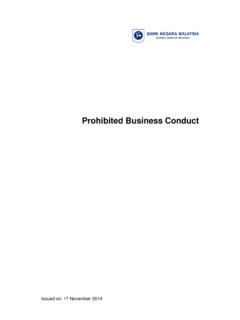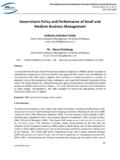Transcription of laws OF MalaYsIa - AGC
1 Peaceful Assembly1laws OF MalaYsIaact 736peaceFul asseMblY act 2012 laws of Malaysia2Ac t 736 Date of Royal Assent .. 30 January 2012 Date of publication in theGazette .. 9 February 2012publisher s copyright cpercetakan nasIOnal MalaYsIa berhadAll rights reserved. No part of this publication may be reproduced, stored in a retrieval system or transmitted in any form or by any means electronic, mechanical, photocopying, recording and/or otherwise without the prior permission of percetakan nasional MalaYsIa berhad (appointed printer to the Government of MalaYsIa ).
2 Peaceful Assembly3 ARRANGEMENT OF sEcTiONsPa r t IpREliMiNARy section 1. short title, commencement and non-application 2. Objects 3. interpretationPa r t IIRiGhT TO AssEMblE pEAcEAbly AND WiThOuT ARMs 4. Right to organize assembly or participate in assembly 5. Right of person who has interestsPa r t IIIREspONsibiliTiEs OF ORGANizERs, pARTicipANTs AND pOlicE 6. Responsibilities of organizers 7. Responsibilities of participants 8. Responsibilities of policePa r t IVREquiREMENTs ON ORGANiziNG OF AssEMbly 9.
3 Notification of assembly 10. Requirements regarding notification of assembly 11. consent of owner or occupier of place of assembly 12. Requirement to inform persons who have interests 13. Meeting with organizer 14. Response to notification of assemblylaws OF MalaYsIaact 736peaceFul asseMblY act 2012 laws of Malaysia4 15. Restrictions and conditions 16. Appeal on restrictions and conditions 17. simultaneous assemblies 18. counter assembly 19. presumption as to organizerPa r t VENFORcEMENT 20.
4 Power of arrest 21. power to disperse assemblyPa r t VIMiscEllANEOus 22. Maintenance of register 23. Recordings 24. Media access 25. Designated place of assembly 26. power to amend schedules 27. Regulations FI r s t sc h e d u l e se c o n d sc h e d u l e th I r d sc h e d u l e Fo u r t h sc h e d u l e sectionAc t 736 Peaceful Assembly5An Act relating to the right to assemble peaceably and without arms, and to provide restrictions deemed necessary or expedient relating to such right in the interest of the security of the Federation or any part thereof or public order, including the protection of the rights and freedoms of other persons.
5 And to provide for related matters. [ ]enacted by the parliament of MalaYsIa as follows:Pa r t ipREliMiNARy short title, commencement and non-application1. (1) This Act may be cited as the peaceful Assembly Act 2012. (2) This Act comes into operation on a date to be appointed by the Minister by notification in the Gazette. (3) This Act shall not apply to (a) an assembly which is an election campaign under the Election Offences Act 1954 [Act 5]; and (b) an assembly which is a strike, lock-out or picket under the industrial Relations Act 1967 [Act 177] and the Trade unions Act 1959 [Act 262].
6 laws OF MalaYsIaact 736peaceFul asseMblY act 2012 laws of Malaysia6 Objects2. The objects of this Act are to ensure (a) so far as it is appropriate to do so, that all citizens have the right to organize assemblies or to participate in assemblies, peaceably and without arms; and (b) that the exercise of the right to organize assemblies or to participate in assemblies, peaceably and without arms, is subject only to restrictions deemed necessary or expedient in a democratic society in the interest of the security of the Federation or any part thereof or public order, including the protection of the rights and freedoms of other in this Act, unless the context otherwise requires rights and freedoms of other persons includes (a)
7 The right to peaceful enjoyment of one s possession; (b) the right to freedom of movement; (c) the right to enjoy the natural environment; and (d) the right to carry on business; road has the meaning assigned to it in the Road Transport Act 1987 [Act 333]; child means a person below the age of fifteen years; Minister means the Minister charged with the responsibility for home affairs; person who has interests means a person residing, working or carrying on business or having or owning residential or commercial property in the vicinity of or at the place of assembly; organizer means a person who is responsible for the organization of an assembly, including the arranging, convening, collecting or forming of the assembly, or who is responsible for the conduct of an assembly.
8 Ac t 736 Peaceful Assembly7 assembly means an intentional and temporary assembly of a number of persons in a public place, whether or not the assembly is at a particular place or moving; counter assembly means an assembly organized to convey disagreement with the purpose for which another assembly is organized, and held at the same time, date and place or approximately at the same time, date and place as the other assembly; simultaneous assemblies means two or more assemblies to be held at the same time, date and place, but which have no relationship to each other; participant means a person intentionally or voluntarily present for the purpose of an assembly; street protest means an open air assembly which begins with a meeting at a specified place and consists of walking in a mass march or rally for the purpose of objecting to or advancing a particular cause or causes.
9 Arms means any firearm, ammunition, explosive, corrosive, injurious or obnoxious substance, stick, stone, or any weapon or object, which by its nature, can be used to incite fear or cause injury to persons, or damage to property; public place means (a) a road; (b) a place open to or used by the public as of right; or (c) a place for the time being open to or used by the public, whether or not (i) the place is ordinarily open to or used by the public; (ii) by the express or implied consent of the owner or occupier; or (iii) on payment of money; laws of Malaysia8 prohibited places means (a) the protected areas and protected places declared under the protected Areas and protected places Act 1959 [Act 298]; and (b) the places as may be specified in the First schedule.
10 Place of assembly means the place where the assembly is held and in relation to a procession, includes a place at or through which it is proposed the assembly will stop or pass; designated place of assembly means a place designated by the Minister under section r t iiRiGhT TO AssEMblE pEAcEAbly AND WiThOuT ARMsright to organize assembly or participate in assembly4. (1) The right to organize an assembly or participate in an assembly peaceably and without arms under this Act shall not extend to the following: (a) a non-citizen; (b) an assembly held at any prohibited place and within fifty metres from the limit of the prohibited place; (c) a street protest; (d) in relation to the organization of an assembly, a person below the age of twenty-one years.


